Many things that seem crazy from one world-view appear downright inevitable from another. Case in point.
Many things that seem crazy from one world-view appear downright inevitable from another. Case in point.
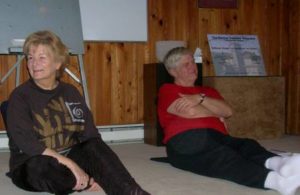
Carol Sabick and Skip Atwater, facilitating the Monroe Institute course in Remote Viewing, March, 2007.
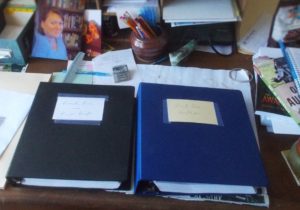
Two drafts of Dark Fire, second draft on the right if you can see the second draft looking any slimmer than the first, that’s more than I can do! We’ll see what the third (and final?) draft weighs in at.
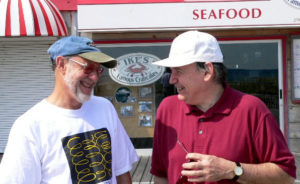
My good friend Charles Sides and me, at Ocean City, New Jersey a few years ago. I live in hope of Charles finishing his precis and interpretation of the Rita material, which seems to be coming along. If and when he finishes, I will consider forgiving him for moving to Darkest Ohio.
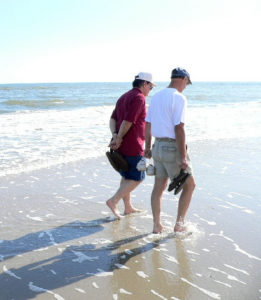
Charles and me walking on water. (Well, that’s how I like to think of it!)
I finished draft number two of Dark Fire just before midnight last night. Now I will let it sit for a while so that I can re-read it from a fresh place, to see how I like it. Meanwhile, a chance to do all the other things I have been ignoring, these past seven months!
Taken the other day. Finished with the elaborate schedule of eyedrops that followed cataract surgery and lens replacement. Assuming that all is well at the one-month post-op appointment next week, we can chalk up a success.
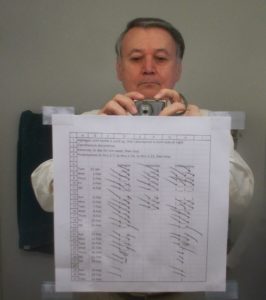
I have been doing some re-reading amid all my reading, and amid revising Dark Fire, and among the things I am re-reading is Chasing Smallwood. I’m amazed how good it is!Anyway, found this, from a journal entry of Feb. 16, 2006:
.31. God-fearing men
[7 a.m. Thursday, February 16, 2006]
It feels like I haven’t heard from myself this good while. I have been reading, reading. Sam Watkins and then Elisha Hunt Rhodes. And a bit of re-reading – Far Memory by Joan Grant.
[Watkins, who had been a private in the Confederate army, wrote a book of memoirs called Company Aytch. Rhodes began as a private and rose to the rank of colonel in the Union Army. All for the Union is a book compiled from his diary and letters by his great-grandson. Both men were extensively cited in Ken Burns’ “Civil War” series.]
I wound up liking Elisha Hunt Rhodes very much, though I suspect that he and I would be farther apart in temperament than Sam Watkins and I would be. But his political opinions and his determination to do his duty are very appealing. He found that he liked army life. I don’t think that Sam Watkins ever would have, even if he’d been paid and fed. But then Watkins joined after he was 30, and Rhodes before he was 20.
All right, to work. Joseph, what is your reaction to Watkins and Rhodes? And do you communicate “up” there? And, does my watching “the Civil War” facilitate communication for you somehow? And, what in general is your life there? (May want others on that last question.) And don’t think I don’t suspect prompting when I come up with bright questions like these.